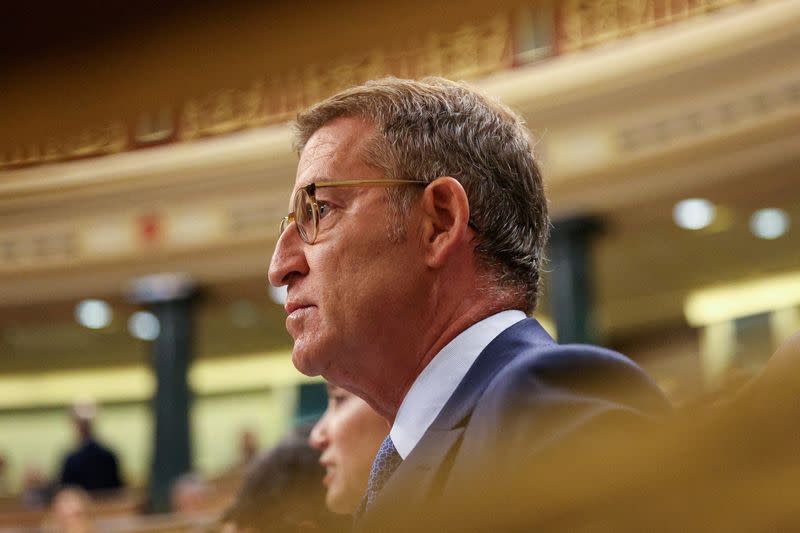Spain's acting PM rejects conservative leader's request to back premiership bid
MADRID (Reuters) -Spain's acting Prime Minister Pedro Sanchez on Wednesday rejected a request from Alberto Nunez Feijoo, leader of the conservatives, to support him in a vote to form a government and will instead seek a new term himself, his Socialist Party said.
Feijoo's People's Party won the most seats in the July 23 elections, but came short of a working majority and is trying to garner enough support in the lower house.
He had asked Sanchez, a Socialist, in a meeting earlier on Wednesday to back him for at least two years in exchange for policy pacts. In a document handed to Sanchez, Feijoo had said a two-year government pact could be extended if both parties agreed. Legislatures last four years in Spain.
"Unfortunately, what I have obtained, as far as I understood, is a no," Feijoo told reporters.
Sanchez did not speak to the media, but Socialist Party spokesperson Pilar Alegria ruled out support for Feijoo's premiership bid.
"What Mr. Feijoo has is a majority against his investiture," Alegria, who is also acting education minister, told reporters. "When he fails and we know he will, we'll work, propose and win the investiture."
A vote is scheduled for Sept. 27.
Sanchez said earlier this month he also intended to seek a vote in the lower house to remain as prime minister.
Last week, King Felipe handed Feijoo the mission of forming the government.
A candidate for premiership needs to secure an absolute majority of at least 176 in the 350-member assembly in a first vote, or a simple majority of more votes in favour than against in a second vote held within two days of the first.
Far-right group Vox and two small regional parties have said they will back Feijoo, giving him 172 votes.
Feijoo made his offer to Sanchez' socialists to avoid winning over support from separatist groups with concessions he is unwilling to grant, he said.
On Aug. 17, Sanchez managed to secure 178 votes, with support from left-wing and regionalist parties, to get its candidate elected as speaker.
The smaller parties have said their vote for the speaker didn't imply automatic support for a Socialist-led government.
(Reporting by Emma Pinedo and Inti Landauro, editing by Andrei Khalip, Tomasz Janowski and Sharon Singleton)



